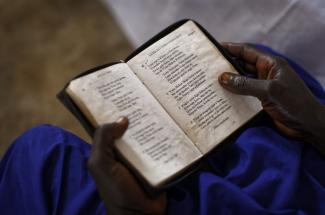Linguistics
European languages are dominant in Africa

So, when colonial administrations imposed their European – and thus very alien – languages on colonised peoples, they had a profound effect on those peoples’ identity. English, French and Portuguese became official languages and languages of education. And they still retain that status today. Even decades after independence, the elite in many countries in Africa speak the language of the former colonial power. And in nearly every country, that language is an official language – in many cases the only one – and language of instruction.
In Cameroon, which was partly a British and partly a French colony, English and French are official languages. In former Belgian Rwanda, English, French and Kinyarwanda enjoy equal official status. European languages also rank alongside local ones in Botswana (English and Setswana), Malawi (English and Chichewa) and Burundi (French and Kirundi). Ethiopia (Amharic), which was never a colony, Somalia (Somali and Arabic) and Tanzania (Swahili and English, but the latter only in communication with foreigners) are exceptions without a dominant European language. South Africa has 11 official languages, with English the main common language.
The imposition of foreign languages by conquerors had both a divisive and a unifying effect that still persists today. Linguistic boundaries were arbitrarily drawn by colonial powers, driving wedges between what had been largely homogeneous groups. In Cameroon, for instance, conflicts flare up today between Francophone and Anglophone communities (see main article). Also, because access to the colonial language – and thus education – was exclusively or predominantly confined to the urban population, marginalisation occurred.
In many countries today, it is still the case that rural communities speak only local African languages and urban elites communicate in a world language, which opens doors to education in North America or Europe and affords access to international contacts and better employment prospects. Sometimes, those elites no longer speak local languages well.
Where children in schools are not taught in their native language, there are drawbacks. The children themselves face the additional hurdle of having to learn the language of instruction. And local languages, which are often transmitted only orally, face a less certain future. In some places, local languages are considered inferior; colonial thinking thus persists. Linguists call for everyday languages to be brought out of the private domain, for example by radio programmes, newspapers and periodicals or book translations.
In some African countries, however, the European official language is the only language that unites the nation. Nearly every nation is a collection of linguistic groups – sometimes hundreds of them. Multilingualism is the norm but nationwide overlaps are the exception. So English, French or Portuguese serve as a lingua franca – even across national borders. Anyone who speaks French can manage perfectly well in large parts of West Africa; English is dominant in southern and eastern parts of the continent.
A European lingua franca is a language of foreign despotic rule but as such it stands above ethnic conflicts and is thus able to play a neutral role. The best solution for Africa does not seem to be the complete elimination of colonial languages but the coexistence of African and European languages on an equal footing. (kd)







